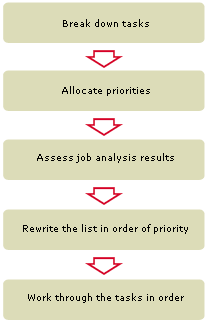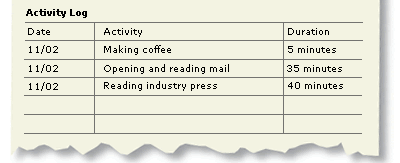In corporate America, especially, people often rise to the top by learning how to overcome stress.
—In corporate America, especially, people often rise to the top by learning how to overcome stress.
People often create great stress by underestimating
the length of time activities will take to complete. Improving your time
estimation skills will help you to handle a highly demanding and
potentially stressful workload.
Take Control
Time management helps you
to reduce long-term stress by giving you direction when you have too
much work to do. It puts you in control of where you are going, and
helps you to increase your productivity. By eliminating time-wasting and
low-yield activities you will be making the best use of your time, you
will enjoy your current role more, and will find that you are able to
allocate more time to relaxing outside work and enjoying life. Being
disciplined in your approach to your working life will reduce your
stress levels.
Assess the person interrupting you and what it is they are asking.
If one or both are important to you it makes sense to say yes;
otherwise, learn to say no.

5 Minute Fix
Others may be unaware that they are adding to your
stress. Don’t just say “yes” when you‘re already overloaded.
Prepare some polite but assertive ways of turning the extra work away.
Negotiate to defer or reprioritize work for the person asking.
Ask for some extra resources or time to carry out the work.
Techniques to Practise
In order to know how productively you are using your
time, you need to know just how much your time is worth.
If you are in the employment
of someone else, it is important to understand how much your employer
is paying for your time and the resources you use, and how much profit
you are expected to generate. If you are working for yourself, you
should have a good idea of how much income you need to cover the
expenditure of your time.
Work these figures back to an hourly rate.
Looking at your workload, estimate the value to the organization of each task you perform.
Using your hourly rate, work out the rough cost of each task you carry out.
Where you have a choice, concentrate on tasks with a value greater than the calculated value of your time.
Whenever possible, eliminate or delegate tasks that have a lower value than your time.
Assess How You Spend Your Time
An activity log, in
which you simply record what you are doing throughout the day, is an
important tool for reviewing your use of time. It helps you to
understand how you use your time, so that you can identify and eliminate
time-wasting and unproductive habits. This gives you more time to do
your work and increases your efficiency, making it more likely that you
will be able to leave work on time and have good quality time to
yourself to relax. When you start keeping your log you will probably be
surprised at how much time you waste every day. Eliminating any
unproductive activities will put you back in control.
Tip
Cutting out time wasting often involves saying “No”
to people. Whenever you have to do this, be courteous and explain why.
Compile and Use Your To Do List
When problems seem overwhelming, or there is a huge
number of demands on your time, keeping a to do list will help you to
establish priorities and gives you a starting point for negotiating
deadlines.
Break down large tasks into their component elements. If these
still seem large, break them down again. Do this until all tasks are
shown as manageable pieces of work.
Run through the tasks and allocate priorities from A (very
important) to F (unimportant). Base your assessment of priority on the
criteria of urgency and importance.
Consider the results of your job analysis when prioritizing your
list. Tasks that contribute to your job objectives should rank as high
priority.
If too many tasks have a high priority ranking, run through the
list again and demote the less important ones. Once you have done this,
rewrite the list in order of priority.
Now, work your way through the tasks on your list in order of
priority. By doing this, you will do the most important jobs first and
will therefore make the best use of your time.
Establishing
priorities will make your workload more manageable and will reduce your
stress, so write down a complete list of all the tasks that face you
now.

Analyze Your Activity Log
Every time you change
activities, note the activity’s duration. You may decide to integrate
your activity log with your stress diary. Do this for several days and
then analyze the log. You may be alarmed to see the amount of time you
spend doing low value jobs such as reading direct mail or newspapers,
browsing interesting but unhelpful web pages, talking to colleagues,
waiting for meetings to begin, travelling, etc.
Using a template like the one shown here, make a note of all the things you do each day, as you do them.

Use a To Do List
Once you know which
tasks are most valuable, and which time-wasting activities can be
eliminated, you can organize and prioritize your workload to ensure that
you concentrate on the most important, highest-yield work. Keeping a to
do list is a basic working skill that helps you to deliver work
reliably, without letting tasks “slip through the cracks”. This
obviously helps in reducing the stress that rightly comes from failing
to do something important!